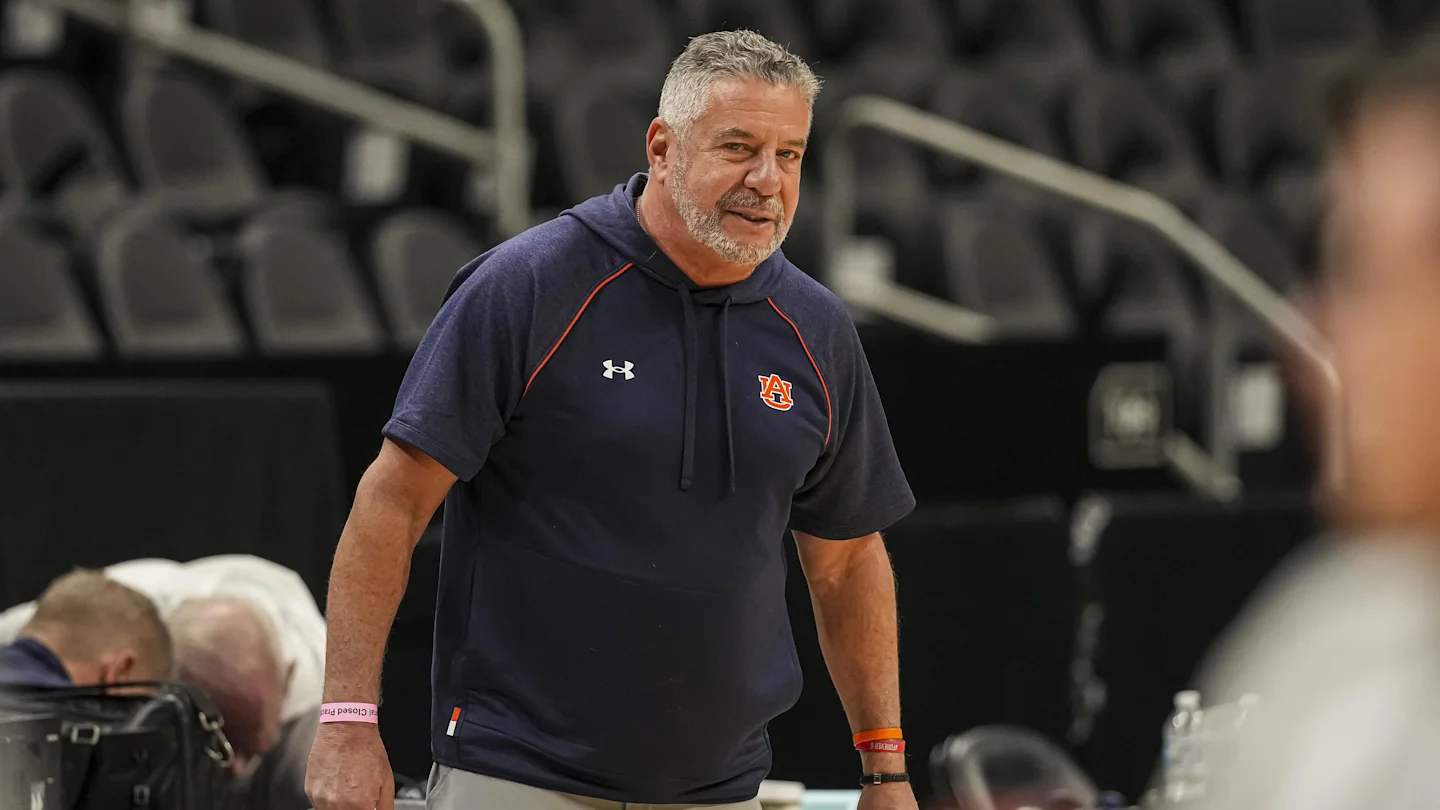Michigan Basketball: Dusty May and Bruce Pearl, the head coach of Auburn, discuss defending the Wolverines’ twin towers and history.
The NCAA Tournament always delivers intriguing matchups, and this year’s Sweet Sixteen clash between Michigan and Auburn is no exception. The game features a compelling contrast in styles: Michigan’s towering frontcourt duo, known as the “Twin Towers,” against Auburn’s relentless, disruptive defense. With both teams seeking a path to the Elite Eight, head coaches Dusty May and Bruce Pearl have devised their respective strategies for the high-stakes contest.
Michigan’s Resurgence Under Dusty May
First-year head coach Dusty May has revitalized Michigan basketball. After a disappointing 8-24 season, the Wolverines have stormed back onto the national scene, largely due to the acquisition of two dominant big men: Danny Wolf and Vladislav Goldin. These towering figures have been instrumental in Michigan’s success, forming one of the most formidable frontcourts in college basketball.
Danny Wolf, standing at 7 feet, has proven to be an incredibly versatile player. Leading the Big Ten in rebounding with 9.8 boards per game, Wolf also contributes 13.0 points per game and ranks second on the team in assists, showcasing a skill set that extends far beyond traditional post play. Notably, he has provided 51 assists to Goldin, emphasizing their on-court chemistry.
Goldin, at 7-foot-1, is equally dominant. Averaging 16.7 points and 6.7 rebounds per game, he brings an efficient scoring presence inside while protecting the rim defensively. His physicality and footwork make him a nightmare for opposing defenses, and his ability to play off Wolf’s passing makes Michigan’s offense even more lethal.
May’s philosophy revolves around playing to his team’s strengths—size and versatility. His offensive schemes emphasize high-low action, post touches, and spacing that allows his big men to operate effectively. His strategy is simple but effective: force opponents to adjust to Michigan’s size, not the other way around.
Auburn’s Defensive Identity Under Bruce Pearl
While Michigan thrives on size, Auburn’s success stems from its aggressive and high-pressure defensive philosophy. Head coach Bruce Pearl has long been known for his teams’ ability to disrupt opponents, forcing turnovers and dictating the tempo of the game.
Pearl describes his approach best:
“We really like to try to be disruptive defensively… I like to be disruptive rather than defensive. We want to make it hard for you to run the stuff that you like to run.”
Auburn’s defense currently ranks 18th in the nation per KenPom, thanks in large part to their ability to pressure guards, force difficult passes, and recover quickly on rotations. The challenge against Michigan will be dealing with the Wolverines’ size advantage. Auburn has traditionally thrived against guard-heavy teams, but matching up against two elite big men presents a different kind of defensive puzzle.
Pearl’s primary concern is Michigan’s ability to establish deep post position. Unlike perimeter-oriented teams, the Wolverines don’t rely on dribble penetration to generate offense. Instead, they look to establish Wolf and Goldin in the low post, where they can either score or kick out to shooters. Auburn’s success will hinge on their ability to deny these entry passes and force Michigan’s bigs to catch the ball farther from the basket.
Defensive Strategies Against Michigan’s Twin Towers
Stopping Wolf and Goldin is no small task, but Auburn has several potential defensive strategies they can employ:
1. Fronting the Post
One method Auburn may use is fronting Michigan’s big men to deny easy entry passes. By positioning their defenders in front of Wolf and Goldin, Auburn can force Michigan’s guards to lob passes over the top. This strategy relies on weak-side help defense to rotate quickly and contest any attempted lobs.
2. Double Teams and Traps
Another likely strategy is doubling the post as soon as the ball is entered. Given Wolf’s ability to facilitate from the post, Auburn must be selective about when and how they send double teams. If they collapse too aggressively, Michigan’s perimeter shooters could find open looks. Instead, Auburn may choose to send delayed or weak-side double teams to disrupt the Wolverines’ rhythm.
3. Forcing Mid-Range Shots
Auburn will aim to push Michigan’s bigs away from the basket, forcing them to settle for mid-range jumpers rather than high-percentage post moves. While both Wolf and Goldin are capable shooters, Auburn would rather see them taking contested 15-footers than easy layups and dunks.
4. Speeding Up the Tempo
One of Auburn’s biggest advantages is its transition offense. By pressuring Michigan’s guards and forcing turnovers, Auburn can create fast-break opportunities before Michigan’s big men have a chance to get back and set up in the half-court. This strategy will test Michigan’s ball-handling and perimeter decision-making under pressure.
The Impact of Guard Play
While much of the focus is on the frontcourt battle, the play of the guards could ultimately decide the game. For Michigan, the ability of their backcourt to handle Auburn’s full-court pressure will be crucial. If Michigan’s guards struggle with turnovers, it could allow Auburn to control the tempo and keep the game at a pace that favors them.
Conversely, Auburn’s guards will need to be efficient in attacking Michigan’s defense. With the Wolverines’ shot-blocking presence inside, Auburn must rely on crisp ball movement, timely perimeter shooting, and quick decision-making to break down Michigan’s defense. If Auburn can hit their outside shots early, it may force Michigan’s big men to extend their defense, creating driving lanes for the Tigers’ guards.
Historical Context and What’s at Stake
This game is more than just a battle of styles—it’s a defining moment for both programs. Michigan is looking to complete its resurgence under Dusty May, proving that the Wolverines are back as a national powerhouse. A win would cement May’s first season as an overwhelming success and set the foundation for future deep tournament runs.
For Auburn, Bruce Pearl continues to build on his program’s reputation as a formidable force in the SEC and beyond. A win over Michigan would further solidify Auburn as a perennial contender and validate their defensive philosophy against a uniquely challenging opponent.
Prediction: Who Has the Edge?
This matchup is incredibly close, with both teams possessing clear strengths and weaknesses. If Michigan can establish their inside presence early and force Auburn into foul trouble, they will have a significant advantage. However, if Auburn can speed up the game, force turnovers, and knock down perimeter shots, they have the tools to pull off the upset.
Ultimately, the outcome will likely hinge on execution. If Michigan’s Twin Towers dominate the paint and control the boards, it’s hard to see Auburn overcoming that disadvantage. But if Auburn can dictate tempo and disrupt Michigan’s offensive flow, they have a real shot at advancing to the Elite Eight.
Regardless of the outcome, this clash of styles is a must-watch game in this year’s NCAA Tournament. Fans can expect a battle of size versus speed, strategy versus adaptation, and two excellent coaches looking to outmaneuver one another on the sport’s biggest stage.



